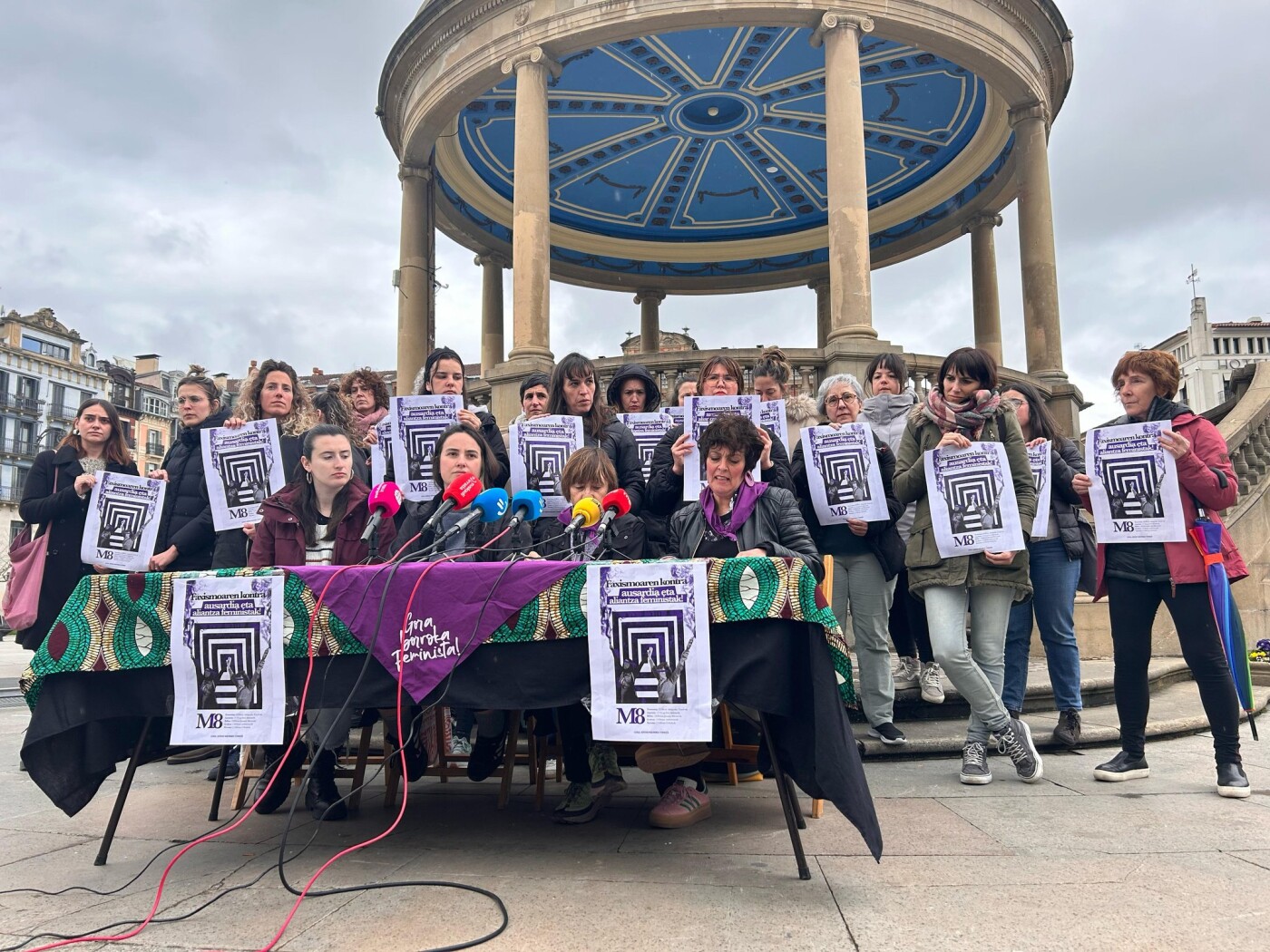"With the contrasts, the aggressor and the victim are on the same level"
- Activists working against gender-based violence have noted that it is becoming more and more common for men denounced for male chauvinist violence to join aggression against the victim. Attorney Juana Balmaseda Ripero has assured that this is a strategy to take away credibility from the woman’s denunciation. In the event that they report each other, what has happened is often seen as a domestic incident, rather than as a chauvinist violence. Balmaseda is the representative of the advocacy sector in the working group coordinated by Emakunde to deal with gender violence and sexual assaults.

Is it increasingly common for aggressors to denounce the victim as a judicial strategy?
I have come a long way in the world of law and I can clearly say, as I have seen in recent years, that aggressors have learned a great deal. Among the strategies developed to deal with complaints against them, it is common for the defendant to also file a complaint, that is, we are increasingly seeing how the alleged perpetrator denounces the victim.
What are the reasons behind this strategy?
On the one hand, of course, it is a strategy for the judicial process. On the other hand, there is also the intention to remove the force of the victim, or to question its credibility, to generate doubts. The perversions that this can cause can be very large, to the point of distorting the whole process.
This strategy sometimes seems to produce a good result.
Many of the defendants are considered victims. The messages of the detainees are taken into account by different actors in the field of justice, who consider that they have been affected by a system that benefits women. The system shows its patriarchal basis when it starts from a complaint of interest and is on the side of man. It is clear that this benefits those engaged in this strategy, otherwise they would not continue to do so.
“I know more than one case in which women have been convicted of ill-treatment and yet of violence”
Are current laws adequate?
Here we have an obvious problem, because there is a law on the protection of victims, the so-called Comprehensive Law, which, although worthy of criticism, offers many effective measures. But it is not enough to have a law, it also requires a truly critical culture to understand and know how to act in the face of violence against women, a training to apply and interpret the law. Gender and feminist perspectives must be taken into account. In society, the idea has been extended that feminism is a radical ideological attitude, contrary to men. It is not to think, precisely, that feminism is considered as such, that I would consider it as a chauvinist perspective. We need feminism to have a critical view when reading the law. Because you have to be able to interpret the law, the law seems neutral, but there is nothing neutral, much less in this matter. Technical training of judges, prosecutors, lawyers, etc. It's not enough.
In the absence of training, does the area of Justice depend on the prejudices that are spreading in society?
All people involved in the process have to take into account some variables, such as that the aggressor and the victim are not usually in the same position. In the administration of justice I sometimes notice some resistance to chip change, there are prejudices in all areas. If it is not self-criticism, unfounded rumours spread to society, such as the fact that women make many false allegations. On the contrary, there are still many completely silenced forms of violence. For women it is a great effort to denounce, they do not go lightly to the court to get me I do not know what benefit. Unfortunately, by reading some sentences, it is clear that there are still some prejudices. Therefore, if the aggressor denounces the victim, it helps to strengthen these prejudices.
“Maybe yes, the woman has made the attack, but you have to see what’s behind, for example, to defend it.”
Can you incite women assaulted not to report?
Imagine a woman seeing that they can also be punished for domestic violence. It may be, but you have to see what is behind it, for example, to defend yourself. In these cases, he loses his trust in the judicial system. Think of what it is to denounce the aggression and, in the end, that one should be condemned and that the other party should get out of the trial. The batterer is the winner in these cases. This is another form of violence, that is, using the judicial system to commit ill-treatment.
In short, victims, in most cases, are not perfect victims as if it were a theater play or a film. You may not remember everything that has happened, that there are some contradictions, that you do not know how to explain your situation well, or that you do not present the evidence at the right time. That is the reality and many aggressors take advantage of it to put the case in their favour. They take expensive lawyers. There is asymmetry of power and that is noted in the post-denunciation process.
Do the aggressors, even as guilty in the trial, receive a lower sentence than they should, thanks to the counter-strike strategy?
Yes, it is the way to withdraw the force of the prior denunciation of ill-treatment. If there is no history or the woman has nothing denounced before, the judge might think it is a simple internal fight between the couple and the victim. Machista aggression is neglected. Some judges prefer to go down the easy road and absolve the two. On other occasions, however, the magistrate sees that both have exercised violence, and imposes the same penalty on the two defendants. Faced with this situation, many victims decide to reach an agreement, at the end of the day the aggressor and the victim are on the same level and, furthermore, the trial is not moving forward.
The ideal would be to fight, but it doesn't always happen, many prefer not to go ahead for fear of the consequences. I know more than one case in which women have been convicted of ill-treatment and yet of violence. They are not usually harsh punishments, but women are concerned: This makes you doubt what will happen to the care of your children, for example.
“It is not enough for judges, prosecutors, lawyers, etc. technical training, we also
need training to understand gender issues.”
How can we encourage women in this situation to continue fighting?
Women must be encouraged to denounce, but they must be clearly explained what they are going to find. They must be given adequate protection, not just in the area of the law. Also in health, in psychology and in many other areas. Dealing with such a process is hard and it is important that women be prepared, it is a matter of empowerment. A political and social commitment is needed, and the victim cannot be left alone in trying to turn the situation around.
What would you recommend to an assaulted woman to have maximum guarantees in the process?
First of all, if it is a physical aggression, I would recommend that you go to the health center, that there be a testimony and, later, report. It is also essential to seek appropriate legal advice, to know what it means to denounce. In addition, it is appropriate to take care of security, denounce frequently and return home is to put us at greater risk. All those who guide women have an enormous responsibility in advising and respecting the victim’s vision. The complaint is a judicial tsunami that cannot be dealt with in any way.
But what is the way to detect false allegations for those on trial?
The fact that the alleged aggressor has lodged a complaint does not mean that it is false. He will explain the facts from his point of view, it may be that the victim has beaten the aggressor to protect himself. But we have to distinguish what the violence used for defence is. To do so, the tests must be followed, at the advice of the experts or witnesses. It is necessary to check whether the facts described in the complaint have actually occurred, sometimes it is clear that a blow or injury has only been defensive. When we know of mistreatment, it is essential to understand that it is not an isolated fact, but the result of a deeper problem. If this is not internalized, it is not easy to see who the actual victim is, what help he needs and what resources he needs to provide.
Prentsaurrekoa eskaini dute ostegun honetan Marc Aillet Baionako apezpikuak, elizbarrutiko hezkuntza katolikoko zuzendari Vincent Destaisek eta Betharramgo biktimen entzuteko egiturako partaideetarikoa den Laurent Bacho apaizak. Hitza hartzera zihoazela, momentua moztu die... [+]
Antifaxismoari buruz idatzi nahiko nuke, hori baita aurten mugimendu feministaren gaia. Alabaina, eskratxea egin diote Martxoaren 8ko bezperan euskal kazetari antifaxista eta profeminista bati.
Gizonak bere lehenengo liburua aurkeztu du Madrilen bi kazetari ospetsuk... [+]
11 adin txikikori sexu erasoak egiteagatik 85 urteko kartzela zigorra galdegin du Gipuzkoako fiskaltzak. Astelehenean hasi da epaiketa eta gutxienez martxoaren 21era arte luzatuko da.
Matxismoa normalizatzen ari da, eskuin muturreko alderdien nahiz sare sozialetako pertsonaien eskutik, ideia matxistak zabaltzen eta egonkortzen ari baitira gizarte osoan. Egoera larria da, eta are larriagoa izan daiteke, ideia zein jarrera matxistei eta erreakzionarioei ateak... [+]
Elizak 23 kasu ditu onarturik Nafarroa Garaian. Haiek "ekonomikoki, psikologikoki eta espiritualki laguntzeko" konpromisoa adierazi du Iruñeko artzapezpikuak.
15 urteko emakume bati egin dio eraso Izarra klubean jarduten zuen pilota entrenatzaile batek.
Lestelle-Betharramgo (Biarno) ikastetxe katolikoko indarkeria eta bortxaketa kasuen salaketek beste ikastetxe katoliko batzuen gainean jarri du fokua. Ipar Euskal Herriari dagokionez, Uztaritzeko San Frantses Xabier kolegioan pairaturiko indarkeria kasuak azaleratu dira... [+]
Bi neska komisarian, urduri, hiru urtetik gora luzatu den jazarpen egoera salatzen. Izendatzen. Tipo berbera agertzen zaielako nonahi. Presentzia arraro berbera neskek parte hartzen duten ekitaldi kulturaletako atarietan, bietako baten amaren etxepean, bestea korrika egitera... [+]
Martxoak 8a heltzear da beste urtebetez, eta nahiz eta zenbaitek erabiltzen duten urtean behin beren irudia morez margotzeko soilik, feministek kaleak aldarriz betetzeko baliatzen dute egun seinalatu hau. 2020an, duela bost urte, milaka emakumek elkarrekin oihukatu zuten euren... [+]
Neska adingabeari sexu abusuak era jarraituan egin zizkiola frogatutzat jo du Bizkaiko Lurralde Auzitegiak.
1989tik 2014ra, Frantzia mendebaldeko hainbat ospitaletan egindako erasoengatik epaituko dute. 74 urte ditu Joel Le Scouarnec zirujau ohiak, eta espetxean dago beste lau sexu eraso kasurengatik.
























